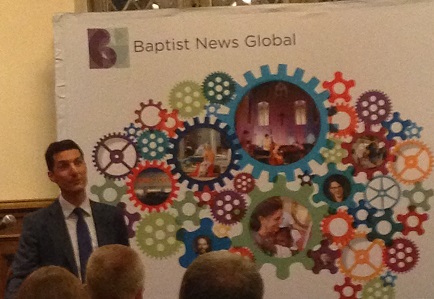By Bob Allen
Christianity has a prophetic word to counter the “politics of denunciation” that argues people are more defined by their differences than their common life as a whole community, Duke University ethicist Luke Bretherton said Oct. 8 at a dinner for directors and friends of Baptist News Global.
Bretherton, author of Resurrecting Democracy: Faith, Citizenship and the Politics of a Common Life said sense of participation in a “shared community fate” in which all can invest is “deeply under threat” in a world that is polarized, atomized and defined by participation in cultural or ecclesiastical silos.
 Bretherton, professor of theological ethics and senior fellow of Duke’s Kenan Institute for Ethics, said he believes today’s highly polarized politics are symptoms of the reality that “people actually don’t think they have anything in common with anyone else.”
Bretherton, professor of theological ethics and senior fellow of Duke’s Kenan Institute for Ethics, said he believes today’s highly polarized politics are symptoms of the reality that “people actually don’t think they have anything in common with anyone else.”
Political consultants capitalize on that polarization by identifying a “scapegoat” to demonize and vilify, drop out all complexity so that the choice is between good and evil, develop a victim mentality so that voters feel helpless, and offer them a messiah.
It’s a script deployed by both left and right, and people are paid a lot of money to get the public to believe it, Bretherton said.
“Your solution is the only solution possible,” he summarized. “If they don’t agree with it they must be crazy or delusional or bad or evil or immoral.”
“Of course, as Christians, we believe in a Christ who came and through whom all things were made and in whom all things were reconciled,” he said. “We gave to resist that script.”
Bretherton said speaking to the “possibility of a common life” in today’s context is “a profoundly prophetic act” and one of the biggest challenges facing the church.
His book, published in December 2014 by Cambridge University Press, examines the “core paradox” of modern democracy, where citizenship is seen as an expression of individual liberty but its performance and defense in great measure depends on participation in a group.
“Whether we like it or not, we have a common life,” Bretherton said. Individuals have differences but a shared humanity, depending on a symbiotic relationship recognizing that people are neither all the same nor fundamentally different.
“I might not like you or might not agree with you,” he said. “I might find you frankly pretty distasteful, but I recognize we are part of a shared community. If the town is flooded, we’re all affected. If gangs roam the streets, whether in the context of the mosque or church, we all feel threatened.”
Bretherton said churches today have an opportunity to model unity among difference, offering an experience where people don’t necessarily agree with each other but “bear witness of a deeper unity.”
“I think finding ways to do that, finding a language to talk about that, is part of our challenge,” Bretherton said.
The dinner event was in conjunction with the Baptist News Global board meeting Oct. 8-9 in Durham, N.C. The Baptist House of Studies at Duke Divinity School served as host.
